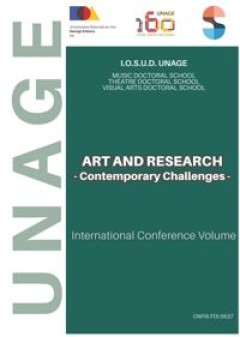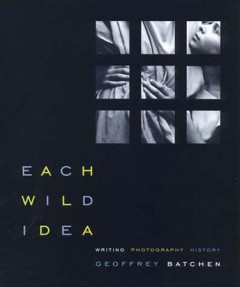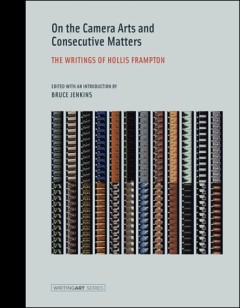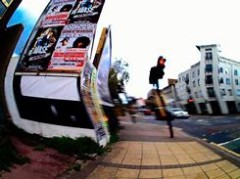Filter by

Art and Research – Contemporary Challenges
In the artistic / vocational academic education field, a phrase like “scientific research” generates several controversies; however, they can be the roots of interdisciplinary approaches, through which to build bridges between concern and research. The conference “Art and Research - contemporary challenges” aims, also through the published volume, to disseminate the results of research …
- Edition
- -
- ISBN/ISSN
- 9788366675193
- Collation
- oer.unej.ac.id
- Series Title
- -
- Call Number
- -

[Given, If, Then]: A Reading in Three Parts
[Given, If, Then] attempts to conceive a possibility of reading, through a set of readings: reading being understood as the relation to an Other that occurs prior to any semantic or formal identification, and, therefore, prior to any attempt at assimilating, or appropriating, what is being read to the one who reads. As such, it is an encounter with an indeterminable Other, an Other who is other…
- Edition
- -
- ISBN/ISSN
- 9780692298374
- Collation
- -
- Series Title
- -
- Call Number
- -

The Tannin Process
SINCE the publication of the first edition the process described in it has been greatly improved. The substratum of gelatine may now be dispensed with, far greater sensitiveness can be obtained, and, which is more important, landscape views can at the same time be produced of better quality. The process as managed at first had one serious fault, which rendered it less suitable for ordinary l…
- Edition
- -
- ISBN/ISSN
- -
- Collation
- iv, 135 p. 17cm
- Series Title
- -
- Call Number
- -

Photo forensics
The first comprehensive and detailed presentation of techniques for authenticating digital images. Photographs have been doctored since photography was invented. Dictators have erased people from photographs and from history. Politicians have manipulated photos for short-term political gain. Altering photographs in the predigital era required time-consuming darkroom work. Today, powerful and lo…
- Edition
- -
- ISBN/ISSN
- 9780262355452
- Collation
- 1 online resource (336 pages).
- Series Title
- -
- Call Number
- -

Each wild idea: Writing, photography, history
"In Each Wild Idea, Geoffrey Batchen explores widely ranging aspects of photography, from the timing of photography's invention to the various implications of cyberculture. Along the way, he reflects on contemporary art photography, the role of the vernacular in photography's history, and the Australianness of Australian photography." "The essays all focus on a consideration of specific photogr…
- Edition
- -
- ISBN/ISSN
- 9780262267892
- Collation
- 1 online resource (xi, 236 pages) :illustrations
- Series Title
- -
- Call Number
- -

On the Camera Arts and Consecutive Matters: The Writings of Hollis Frampton
The collected writings of artist and filmmaker Hollis Frampton, including all the essays from the long-unavailable Circles of Confusion along with rare additional material.
- Edition
- -
- ISBN/ISSN
- -
- Collation
- 1 online resource (xx, 331 pages) : illustrations (some color).
- Series Title
- -
- Call Number
- -

Nonhuman Photography
"Today, in the age of CCTV, drones, medical body scans, and satellite images, photography is increasingly decoupled from human agency and human vision. In Nonhuman Photography, Joanna Zylinska offers a new philosophy of photography, going beyond the human-centric view to consider imaging practices from which the human is absent. Zylinska argues further that even those images produced by humans,…
- Edition
- -
- ISBN/ISSN
- 9780262343367
- Collation
- 1 online resource (viii, 257 pages) :illustrations
- Series Title
- -
- Call Number
- -

In visible presence :Soviet afterlives in family photos
"How Soviet-era family photographs complicate official historical memory-producing forms of individual agency within controlled narratives of history"--OCLC-licensed vendor bibliographic record.
- Edition
- -
- ISBN/ISSN
- 9780262375610
- Collation
- 1 online resource
- Series Title
- -
- Call Number
- -

Visual plague :the emergence of epidemic photography
"Visual Plague claims that what epidemic photography did, besides the individual visualization of each outbreak it depicted, was to transform the way in which we relate to infectious diseases, as both biological and historical agents"--OCLC-licensed vendor bibliographic record.
- Edition
- -
- ISBN/ISSN
- 0262370913
- Collation
- 1 online resource.
- Series Title
- -
- Call Number
- -

The perception machine :our photographic future between the eye and AI
"Analyzing the transformation of photography by computation - and the transformation of human perception by algorithmically-driven images, from CGI to AI - The Perception Machine brings together media theory and neuroscience to understand what it means to live surrounded by image flows and machine eyes"--OCLC-licensed vendor bibliographic record.
- Edition
- -
- ISBN/ISSN
- 0262376636
- Collation
- 1 online resource.
- Series Title
- -
- Call Number
- -
 Computer Science, Information & General Works
Computer Science, Information & General Works  Philosophy & Psychology
Philosophy & Psychology  Religion
Religion  Social Sciences
Social Sciences  Language
Language  Pure Science
Pure Science  Applied Sciences
Applied Sciences  Art & Recreation
Art & Recreation  Literature
Literature  History & Geography
History & Geography